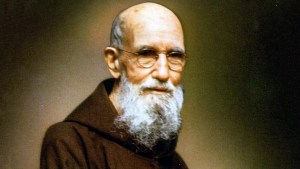It’s not always easy maintaining a spirit of thankfulness and gratitude in our modern world. Surrounded by everything we could ever possibly need or want, we are tempted to think that we are the source of every blessing.
It can lead to a spirit of excessive pride, seeing ourselves as a “god” over our lives and possessions.
Yet, God would say to us, “Where were you when I founded the earth? Tell me, if you have understanding. Who determined its size? Surely you know? Who stretched out the measuring line for it? Into what were its pedestals sunk, and who laid its cornerstone?” (Job 38:4-6)
St. Aloysius Gonzaga similarly recognized that in order to maintain a spirit of gratitude in our lives for all the many gifts God has given us, we must see our weaknesses and our inability to do anything without God.
Being asked by a Brother whether it was difficult for a great nobleman to abandon the vanities of the world, he answered that it was utterly impossible, unless Our Lord put clay upon his eyes, as he did to the man born blind; that is, unless He enabled him to perceive their worthlessness. One day Father Alamanni of the College of Milan came to him for spiritual aid in great distress, because he felt himself so very imperfect. St. Aloysius to console him quoted the words of the 138th Psalm, v. 16. “Thy eyes did see my imperfect being, and in Thy book all shall be written.” He added that though the sight of our imperfections was indeed enough to drive us to despair, yet we may console ourselves by considering that it is with these imperfections that we are written in the book of God, not for our condemnation but to humiliate us and lead us to greater sanctity.
Gonzaga believed that our imperfections hold the key to sanctity and an ability to be thankful to God in every circumstance. Our weaknesses are seen as a benefit, something that doesn’t lead us to despair, but a particular joy knowing that we are not perfect.
With this recognition we can fully embrace our weaknesses and rely entirely on God for everything in our lives. We are not the source of our own blessings. Once we can understand that reality, our hearts can be at peace and call out to God in gratitude.

Read more:
Solanus Casey believed gratitude is sign of a “thinking, rational creature”

Read more:
Gratitude will get you even more than you thought

